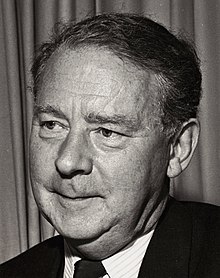Hugh Gaitskell
![]()
This article or subsequent section is not sufficiently supported by evidence (e.g., anecdotal evidence). Information without sufficient evidence may be removed in the near future. Please help Wikipedia by researching the information and adding good supporting evidence.
Hugh Todd Naylor Gaitskell (born 9 April 1906 in London; † 18 January 1963 there) was a British politician. He was leader of the Labour Party from 1955 until his death in 1963.
He studied at Winchester College and New College, Oxford University, where he graduated in 1927 in the combined study of philosophy, politics and economics. In 1933/1934 he was a visiting lecturer at the University of Vienna, where he came into contact with Ludwig von Mises, among others. Gaitskell also witnessed the February struggles and the beginnings of the corporative state, which made him a convinced supporter of parliamentary democracy and a reformist social democrat.
During the Second World War, Gaitskell worked in the Ministry of Economic Warfare under Hugh Dalton, among others, as a private secretary. He was awarded a CBE for his service during the war in 1945. In the 1945 House of Commons election, which resulted in an emphatic Labour victory, he entered Parliament as MP for the Leeds South constituency and subsequently served as personal assistant to Dalton, who was appointed Chancellor of the Exchequer. From 1947 Gaitskell was Minister of Energy (Minister of Fuel and Power), and in 1950 he became Chancellor of the Exchequer, succeeding Stafford Cripps, and served as such until the Conservatives returned to government in 1951. He became party leader in 1955 following the resignation of Clement Attlee in a fighting contest against Aneurin Bevan. He is regarded by some as 'the best Prime Minister we never had'.
In 1959 a Labour victory was expected, but doubts about the feasibility of pension increases and a very successful election campaign by Harold Macmillan under the slogan "Life with the Conservatives is better, don't let Labour destroy it" led to Conservative success. Gaitskell was an early moderniser of his party, but he tried unsuccessfully to amend Section IV of the party manifesto, which provided for extensive nationalisation. In contrast, he successfully resisted attempts to commit Labour to a unilateral position on nuclear armaments; he initially lost a vote but declared: "I will fight, fight and fight again to save the party I love."
Gaitskell died of a sudden onset of the autoimmune disease lupus erythematosus. Harold Wilson, a representative of the left wing, was elected as his successor.
After his death, his wife Dora Gaitskell was raised to the peerage in 1964 as Baroness Gaitskell, of Egremont in the County of Cumberland and was a member of the House of Lords as Life Peeress until her death in 1989.

Hugh Todd Naylor Gaitskell (October 1961)
Search within the encyclopedia